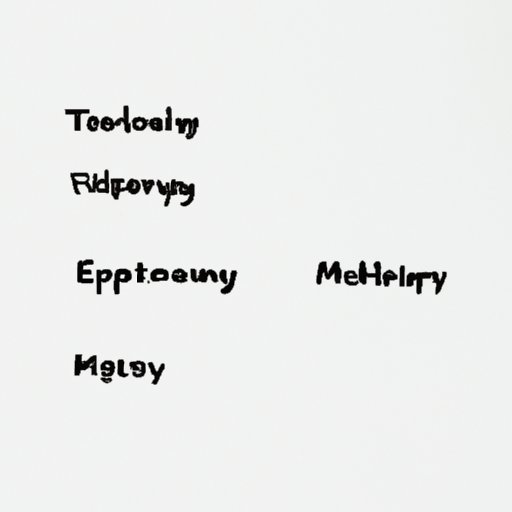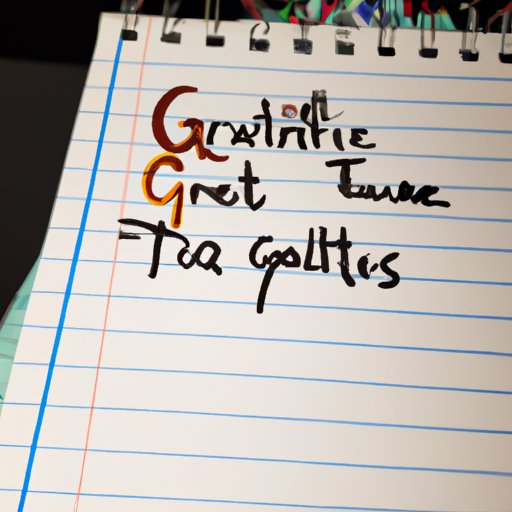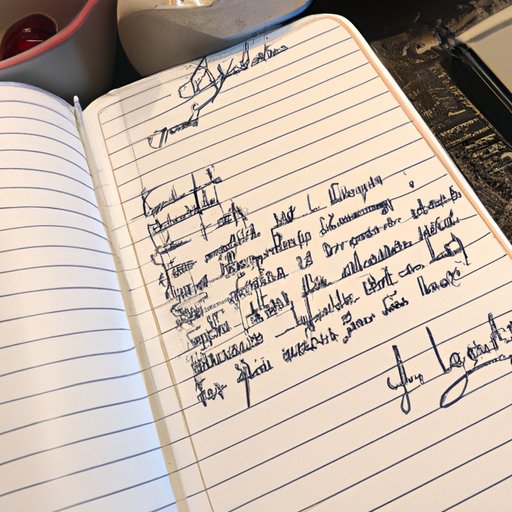Introduction
A diary entry is simply a record of one’s thoughts, feelings, and activities at a particular moment in time. Writing down your thoughts and experiences can help you to better understand yourself and your life, and can provide an outlet for stress and emotion. Whether you’re new to journaling or already have an established practice, this article will provide some helpful tips for getting started with your diary entry.
Begin by Writing Down the Date and Time of the Entry
The first step when starting a diary entry is to note the date and time of the entry. Keeping track of the date and time can help you to remember your experiences more clearly, and can also provide context for the events or emotions you are writing about. If you are using a digital platform for your journaling, the date and time may be automatically saved. Otherwise, make sure to write it at the top of your page.

Describe Your Current Feelings or Mood
After noting the date and time, the next step is to describe your current feelings or mood. This can be an important part of understanding your own emotions and processing difficult experiences. You can start by writing down a few words that describe your current emotion, such as “happy”, “anxious”, or “overwhelmed”. Then, if you feel comfortable, you can go into more detail about why you are feeling this way. You may want to use descriptive language or metaphors to accurately capture your emotions.
Jot Down Any Interesting Facts About Yourself, Your Day, or Your Life
In addition to your emotions, you may also want to jot down any interesting facts about yourself, your day, or your life. This could include information about your physical health, relationships, career, hobbies, or anything else that you think is worth documenting. This can be a great way to keep track of your progress and successes, no matter how small.

Ask Yourself a Few Questions and Answer Them in Your Entry
Asking yourself a few questions and then answering them in your entry can help to prompt further reflection. You can ask yourself questions about your day, your feelings, or even your future goals. For example, you may want to ask yourself “What was the best part of my day?” or “What do I need to work on?” Answering these questions can help you gain clarity and perspective on your current situation.

Make a List of Things You Are Grateful For
Making a list of things you are grateful for can be a great way to end your entry on a positive note. Taking the time to appreciate the good things in your life can help to shift your mindset from negative to positive. It can also help to remind you of all the wonderful things you have in your life, even during difficult times.
Reflect on Something That Has Happened Recently, Good or Bad
Finally, take a few moments to reflect on something that has happened recently, whether it was good or bad. Reflecting on past experiences can help you to gain insight into your behavior and thought patterns, and can also give you a better idea of what you need to work on in the future. Ask yourself questions such as “What did I learn from this experience?” or “What would I do differently next time?”
Conclusion
Writing a diary entry can be a great way to document your thoughts, feelings, and experiences. Begin by noting the date and time, followed by describing your current emotions. Jot down any interesting facts about yourself or your day, and ask yourself a few questions and answer them in your entry. Make a list of things you are grateful for, and reflect on something that has happened recently, good or bad. Keeping up with a regular journaling practice can be a great way to stay connected to yourself and your life. So don’t be afraid to pick up your pen and get started!
(Note: Is this article not meeting your expectations? Do you have knowledge or insights to share? Unlock new opportunities and expand your reach by joining our authors team. Click Registration to join us and share your expertise with our readers.)
